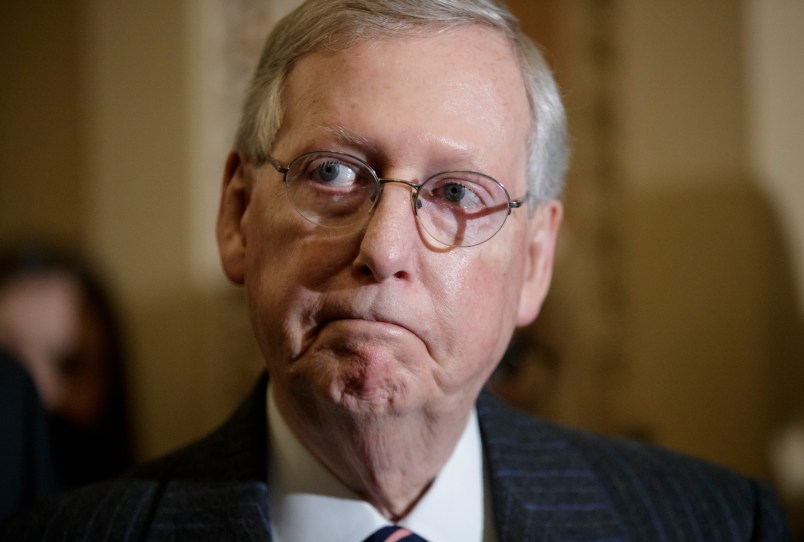Twenty two million fewer people would have insurance under the Senate GOP’s health care bill by 2026 when compared to current law, the Congressional Budget Office said Monday. The CBO’s analysis of the Senate’s Better Care Reconciliation Act, which would partially dismantle the Affordable Care Act, comes just days before the Senate is expected to vote on the bill.
The analysis find that the Senate Republicans did not much better than their House counterparts—whose Obamacare repeal bill the CBO found would result in 23 million losing insurance—in staving off devastating coverage losses under their plans. The CBO said of the Senate bill on Monday that the first round of coverage losses, some 15 million in 2018, would come from the elimination of the individual mandate.
As time goes on, the Senate bill’s deep cuts to Medicaid would take hold, and the CBO predicted that by 2026 enrollment in the program among those under 65 would fall by 16 percent. By 2026, the CBO predicts 15 million fewer people enrolled in Medicaid under the Senate bill compared to current law.
The CBO found that the Senate bill imposes a $772 billion cut on Medicaid and, by making Obamacare’s tax credits less generous, saves the government another $408 billion. Those funding cuts in turn go to pay for the repeal of many ACA taxes (costing the government $541 billion), the loss of the mandates (costing $210 billion) and the funding for states and insurers ($107 billion). The silver lining in Monday’s report for Senate GOP leaders is that their bill altogether reduces the deficit by $321 billion, giving them about $200 billion to play with in order to win the votes of skeptical moderates.
Premiums would increase by 20 percent, compared to current law, under the Senate bill in 2018, largely due to the elimination of the mandate, which will prompt healthy people to exit the risk pools. The “market stabilization” fund proposed by the GOP bill would help blunt that increase in 2019, when premiums would be about 10 percent higher than under current law, the CBO said.
In 2020, when the new tax credit scheme would fully kick in, premiums would drop to 30 percent lower than current law, but the CBO added that decrease would be a result of the Senate bill’s tax credits being pegged to stingier plans with higher deductibles. Low-income people will have the choice between deductibles they can’t afford with the subsidized stingy plan, or premiums they can’t afford with a more generous plan, the CBO said.
“As a result, despite being eligible for premium tax credits, few low-income people would purchase any plan, CBO and JCT estimate.”
As the CBO turned its analysis towards the effect of the Senate bill’s waiver provisions, which allow states to opt out of various ACA insurer mandates, it found again that decreases in premiums come at the cost of higher out-of-pocket costs.

“Out-of-pocket spending would also be affected for the people—close to half the population, CBO and JCT expect—living in states modifying the EHBs using waivers,” the CBO said, referring to Obamacare’s Essential Health Benefits. “People who used services or benefits no longer included in the EHBs would experience substantial increases in supplemental premiums or out-of-pocket spending on health care, or would choose to forgo the services.”
The CBO added that there was a level of uncertainty with its estimates and the “myriad ways that states could implement waivers is especially difficult.”
“Despite the uncertainty, the direction of certain effects of this legislation is clear. For example, the amount of federal revenues collected and the amount of spending on Medicaid would almost surely both be lower than under current law. And the number of uninsured people under this legislation would almost surely be greater than under current law,” the CBO said.
Of the 22 million fewer people expected to be without health insurance by 2026 under the GOP bill, the CBO predicted 7 million would be in the individual market.
“Fewer people would enroll in the nongroup market mainly because the penalty for not having insurance would be eliminated and, starting in 2020, because the average subsidy for coverage in that market would be substantially lower for most people currently eligible for subsidies—and for some people that subsidy would be eliminated,” the CBO said.
The rest of the coverage losses come from from the Medicaid cuts—a combination of the legislation’s winding down of enhanced federal match rate for Medicaid expansion and its transformation of the entire program in a “per capita cap” system.
Under the “per capita cap” system, the feds will limit their contribution to states’ Medicaid programs on a per enrollee basis. Up until 2025, the GOP bill would raise the caps for some enrollees—specifically disabled adults—at a more generous rate than others, allowing states to do some cost shifting, the CBO said. In 2025, a more draconian inflation metric will be imposed on the caps, further reducing federal spending. The CBO was unable to predict the effect the Senate GOP bill would have in the decade after 2026 since it did not have a coverage baseline for those out years.
“However, the agencies expect that after 2026, enrollment in Medicaid would continue to fall relative to what would happen under current law,” the CBO said.
Read the full CBO report here:







Like the GOP is concerned about takers…
Time for everyone in the Democratic Party to shout this from the rooftops.
Q: What’s the difference between a Republican and a Nazi?
A: Nazis put their victims in the gas chambers first.
15MM lose insurance in 2018. good luck in the midterms, assholes.
Thank goodness the “adults” in the Senate fixed this bill’s glaring issues!